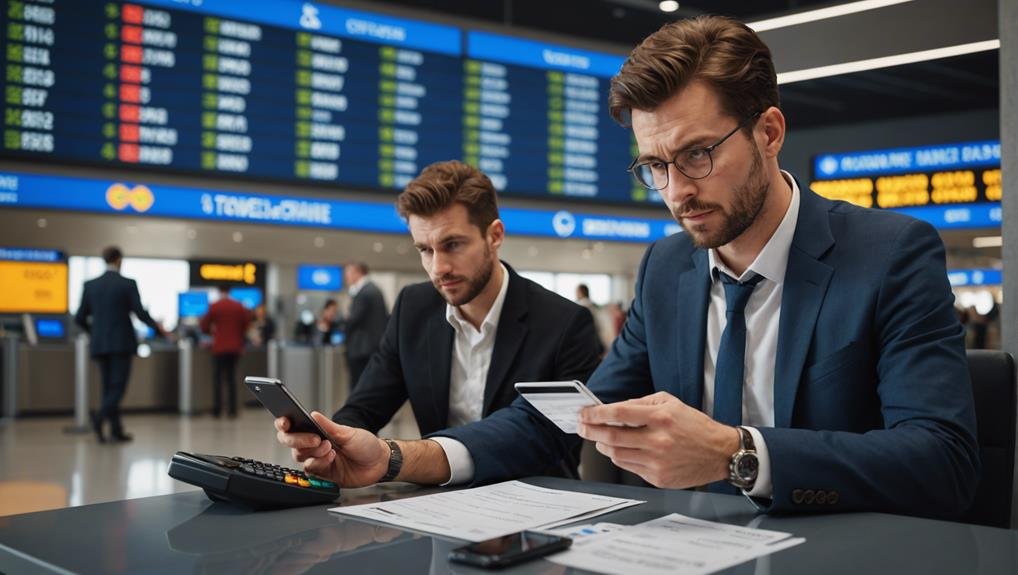Navigating Foreign Transaction Fees: Tips for Travelers
Understanding foreign transaction fees, typically ranging from 1% to 3%, is crucial for international travelers. These fees cover the costs of processing payments abroad and can be impacted by currency exchange rates. Strategic budgeting, researching currency exchange methods, and comparing fee structures across financial institutions can help minimize these costs. Opting for fee-free credit cards like those from MasterCard or Capital One can save travelers money. Additionally, using chip-and-PIN cards, monitoring transactions, and informing banks of travel plans enhance security. Further details on managing foreign transaction costs and securing transactions await for savvy travelers.
Key Takeaways
- Research fee-free credit card options to minimize foreign transaction fees.
- Use chip-and-PIN cards for secure transactions abroad.
- Inform your bank about travel plans to prevent card blocks.
- Monitor account activity for unauthorized charges.
- Compare currency exchange options for favorable rates.
Understanding Foreign Transaction Fees
The understanding of foreign transaction fees is paramount for individuals engaging in international financial transactions. Foreign transaction regulations govern these fees, which are charges incurred when making purchases in a foreign currency. These fees typically range from 1% to 3% of the transaction value and are imposed by financial institutions to cover the costs of international payments.
It is crucial to take into account currency exchange rates when dealing with foreign transactions, as fluctuations can impact the final amount paid. By being aware of these regulations and exchange rate dynamics, individuals can make informed decisions when using electronic payment cards abroad to minimize the impact of foreign transaction fees on their finances.
Managing Foreign Transaction Costs
Understanding the impact of foreign transaction costs on financial transactions is key to effectively managing international expenditures. When it comes to managing foreign transaction costs, strategic planning is essential.
Here are some key tips for budget planning and currency exchange:
- Budget Planning: Create a detailed budget for your trip, including allowances for foreign transaction fees.
- Currency Exchange: Research the best methods for exchanging currency to minimize conversion fees.
- Cost Comparison: Compare foreign transaction fees across different financial institutions to choose the most cost-effective option.
- Transaction Monitoring: Regularly monitor your transactions to track foreign transaction costs and stay within your budget.
Choosing Fee-Free Credit Cards
When selecting fee-free credit cards for international travel, consider researching options from MasterCard, Discover, Charles Schwab, and Capital One to minimize foreign transaction fees. These credit card comparisons are essential for travelers looking to save on international payment options.
Fee-free cards can provide significant cost savings, especially during extended trips where fees can accumulate. Applying for a fee-free card before traveling abroad is advised to avoid unnecessary expenses and inform issuers about travel plans to prevent card freezes.
Tips for Secure Foreign Transactions
Considering the increasing prevalence of international travel and electronic transactions, implementing strong security measures is essential for ensuring the safety of foreign transactions.
To enhance payment security and prevent fraud, travelers should follow these tips:
- Use Chip-and-PIN Cards: Opt for cards with chip-and-PIN technology for secure transactions.
- Monitor Account Activity: Regularly check transaction history to detect any unauthorized charges promptly.
- Avoid Public Wi-Fi: Refrain from conducting financial transactions over unsecured networks to prevent data breaches.
- Notify Card Issuer: Inform your bank about travel plans to prevent potential card blocks due to suspicious activity.
Additional Resources for Travelers
Exploring supplementary resources can enhance the efficiency and convenience of travel for individuals venturing abroad. When it comes to managing foreign transaction fees, understanding currency exchange options and preferred payment methods is essential. Travelers should research the best places to exchange currency without incurring high fees, ensuring they get favorable rates. Additionally, considering whether to use cash or credit cards for transactions, especially in European destinations, can impact overall expenses.
Conclusion
To sum up, managing foreign transaction fees requires a strategic approach to minimize costs and optimize financial transactions.
By understanding the implications of these fees, controlling costs effectively, and utilizing fee-free credit cards, travelers can make informed decisions while abroad.
Remembering to prioritize security measures and accessing additional resources for support can further enhance the travel experience.
Ultimately, mastering the complexities of foreign transaction fees is essential for a successful and cost-efficient journey across borders.







